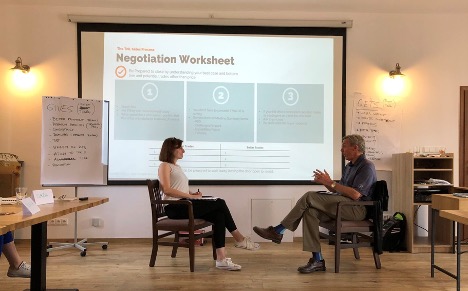In the ever-evolving landscape of sales, one thing remains constant: the importance of a robust sales pipeline. It’s the lifeline of any successful sales professional, a conduit through which potential clients become valued customers. But how do you create and nurture a pipeline that consistently delivers results? The answer lies in skill development.
Archive for year: 2023
Immediately following Sales Process Workshops in Spain and France, John is interviewed by Cristina Lourenco from Acolad on how customized, focused and actionable sales training turns into revenue. Have a listen to what happens before, during and especially AFTER the training that gets results.
As we celebrate the remarkable career of this iconic rockstar, let’s draw inspiration from his enduring success and apply it to the world of sales.
Like Mick, sales professionals must have the charisma and stage presence to captivate their audience. Whether it’s a live performance or a sales pitch, engaging your audience is key.
Just as Mick continuously evolves his music, successful salespeople adapt their approach to meet changing market demands. Embrace innovation and stay ahead of the competition!
Moreover, Mick’s perseverance through challenges is a valuable lesson for sales. In the face of rejection, keep pushing forward, refining your techniques, and learning from each experience.
Lastly, surround yourself with a talented team – just as the Rolling Stones have done. In sales, collaboration and mentorship can amplify your success.
Let’s toast to Mick Jagger’s 80 years of greatness and use his rockstar principles to excel in the art of sales coaching. 🥂 #SalesCoaching #MickJagger80th #Inspiration
Kerri Pottharst and I met on Bondi Beach, Sydney, Australia in 1992. And 8 years after that friendship began, she won the Olympic Gold medal in Beach Volleyball on that same sand, on her “home court” at the pinnacle of her career.
She made the transition to the beach in ‘92 following a damn near career-ending knee injury playing indoor volleyball. And 4 short years later she won the Bronze medal in Atlanta at the 1996 Olympics. Then Bondi Beach GOLD happened in 2000. I will never forget watching her win from a hotel in Vancouver, Canada. Unbelievable, seeing that trajectory, defeating teams that had played beach their entire careers where Kerri was the “older” player out there at the age of 35. What a STORY!
How did she do it? Hard work, skill development, Coaching and a fierce discipline to succeed. It’s all well-documented and has become Kerri’s passion in her post-playing days. In addition to being a volleyball commentator, Coach, Professional Speaker, Businesswoman and Mom to her son Tyson, she is also helping other athletes to tell their stories, and how to transition athletic success into other parts of life.
We had dinner in Manhattan Beach, Los Angeles last week, and Kerri spoke about her journey, ups and downs and the grit to keep moving. A few years ago, she told me that she believes she won the gold medal so that she could help others, and she is doing just that. To learn more about Kerri and her offering, go to www.theathletestory.com.au
In the world of business-to-business sales, referrals have become an invaluable tool for generating leads and driving growth. With the increasing emphasis on relationship-building and trust, businesses are recognizing the power of tapping into their existing networks to unlock new opportunities. A well-executed referral program not only strengthens connections with satisfied clients but also opens doors to a wider pool of potential customers. By leveraging the trust and credibility built through previous successful partnerships, businesses can secure warm introductions that carry a higher likelihood of converting into profitable sales. In an era where trust and authenticity are paramount, embracing the potential of B2B sales referrals is a strategic move that can supercharge your sales pipeline and propel your business towards sustained success.
If only your sales representatives could persuade their customers and prospects as effectively as they convince you, their manager, about the necessity of obtaining SPQs (Special Price Quotes) or discounts at the end of the month or quarter, you wouldn’t find yourself trapped in this predicament driven by buyers. Unfortunately, we often find ourselves in the final days of the month or quarter, where buyers sense the opportunity to negotiate lower prices and push sellers to meet their revenue targets. This scenario has become predictable and tiresome, but with the right approach, it can be handled easily.
Some sellers are well-versed in countering this madness by establishing and emphasizing the value of their offerings early and consistently throughout the sales process. However, if you have neglected this crucial step and are now trying to close deals, it may be too late. If you have already done so, congratulations! You have equipped yourself with insurance for this high-pressure closing dialogue.
According to Forrester Research, a mere 26% of CEOs believe that their salespeople possess the ability to help customers truly comprehend the value their organization provides. So, what about the remaining 74%? They are currently lining up at your office, seeking those SPQs. The decision to grant them lies in how effectively they sell the idea to you.
To prevent this situation from recurring in future quarters, it’s worth examining the insights shared in the blog post “Help Your Sales People Hold Pricing.” Afterwards, don’t hesitate to reach out to us for a conversation. We are prepared and ready. Are your sellers?
In the dynamic realm of business-to-business (B2B) sales, effective sales coaching is paramount to achieving outstanding results. Sales managers play a critical role in guiding and developing their teams, helping them excel in the art of persuasion and relationship-building. In this blog post, we will explore the significance of sales coaching in the B2B space and outline key strategies to help sales managers elevate their coaching game.
- Understanding the Role of Sales Coaching: Sales coaching goes beyond mere instruction or oversight. It is a proactive process that empowers sales managers to foster growth, optimize performance, and drive revenue generation within their teams. By identifying individual strengths, areas for improvement, and aligning them with organizational objectives, sales coaching plays a pivotal role in cultivating a high-performing sales force.
- Developing a Coaching Mindset: Successful sales coaching begins with cultivating a coaching mindset within sales managers. It involves adopting a collaborative approach rather than a directive one. Encouraging open communication, active listening, and empathy can establish a trusting relationship between managers and their sales representatives, creating an environment conducive to growth and learning.
- Setting Clear Goals and Expectations: Clarity is key when it comes to sales coaching. Sales managers must establish clear goals and expectations for their team members, ensuring everyone is aligned and working towards a shared vision. Setting measurable objectives, such as specific revenue targets, customer acquisition rates, or conversion rates, provides a framework for progress evaluation and motivates individuals to strive for excellence.
- Personalized Coaching Plans: Every sales representative possesses unique strengths and areas for improvement. Effective sales coaching requires managers to create personalized coaching plans tailored to each team member’s needs. Conducting regular assessments, such as skill gap analysis or performance evaluations, helps identify specific areas that require attention. By addressing these gaps through targeted training and mentorship, managers can unlock the potential of their sales team members.
- Ongoing Skill Development: Sales coaching is an ongoing process that should foster continuous skill development. Encourage self-reflection and self-assessment among sales representatives, allowing them to identify their own strengths and areas for improvement. Providing access to resources, training programs, and industry insights can further enhance their knowledge and expertise, equipping them with the tools to adapt to evolving market dynamics.
- Effective Communication and Feedback: Communication lies at the core of successful sales coaching. Regular feedback sessions, both individual and collective, allow managers to provide constructive criticism, highlight achievements, and offer guidance. By fostering a culture of open dialogue, sales managers can create an environment where sales representatives feel supported, empowered, and motivated to achieve their goals.
- Lead by Example: Sales managers must lead by example, demonstrating the qualities and behaviors they expect from their team. By exhibiting strong sales skills, effective communication, and a passion for continuous improvement, managers inspire their team members to follow suit. Leading by example builds credibility and trust, fostering a positive coaching environment that drives excellence.
Conclusion: In the competitive world of B2B sales, sales coaching is the catalyst that propels sales teams to surpass their targets. By embracing a coaching mindset, setting clear goals, and developing personalized coaching plans, sales managers can optimize their team’s performance and foster a culture of continuous improvement. Through effective communication, ongoing skill development, and leading by example, sales managers can unlock the full potential of their sales force and achieve remarkable results in the B2B sales arena.
My latest travels took me on a personal getaway to unplug for a while and hit refresh. We all need to do this from time to time as a way to remain healthy and connected in all aspects of life. Listen in on the perspective shared from the Blue Spirit Retreat Center in Nosara, Costa Rica, a magical place indeed (bluespiritcostarica.com). What are you doing to hit “refresh”?
It all started last fall when the team from my original hometown, the Philadelphia Phillies, lost the World Series to the Houston Astros.
Then, in November, the Brown University Women’s Volleyball team lost the Ivy League Championship to Yale. My daughter plays for Brown. Ouch.
Follow that with the Super Bowl in February where my Philadelphia Eagles lost to the Kansas City Chiefs and just two short months later, my beloved San Diego State Aztecs went down to the University of Connecticut in the NCAA Men’s Championship. It was starting to feel personal…..
In sales, a loss is a loss — even if you’re the runner-up. After all, we only get paid when we win. And when we do not, we often hear buyers attempt to let us down softly with vague explanations such as “your product didn’t have this bell or whistle,” or, our favorite “you were just too expensive.”
But in sales, as in sports, what happens next is important. Do we take the time to learn why we lost? As we were developing that opportunity, where did things start to go awry?
We’re proud to say that the sellers we work with do. They have such a clearly articulated and aligned selling process that they can tell exactly where in the buying cycle something got missed. Maybe the buyers went quiet or skipped an agreed-upon next step?
One of the most important jobs Flannery Sales Systems does for our customers is to help them refine their sales process to ensure it is strategically aligned with the buying cycle. Doing this drastically increases their probability of success.
Want to minimize your chances of ending up in the dreaded runner-up position? Make sure the following checkpoints are an integral part of your sales process:
- Do we have all key players identified?
- Have we had targeted conversations with all key players BEFORE sending a quote or proposal?
- Can all key players articulate our core value proposition?
- Have we been able to build an implementation plan before the proposal is delivered?
Most of our customers’ selling situations are similar (despite the dire need some have of telling us “this one is UNIQUE”). Coaching them to use a sales process not only helps them understand how to win, but also has the added benefit of helping them identify where things go wrong. It is never pleasant to lose, but when it happens, we will take the time to learn from it as we set our sights on our next big win.
Following two weeks in Europe delivering three Sales Process Workshops, I went to Marrakesh, Morocco to unwind and enjoy their amazing culture. While in the nearby Atlas Mountains, and in the thriving city, we kept hearing about the power of storytelling as a means of communication for centuries. Click on the video above to hear how storytelling transfers into sales success when pursuing new business and growing existing accounts. And click here to learn how to use this valuable tool.





